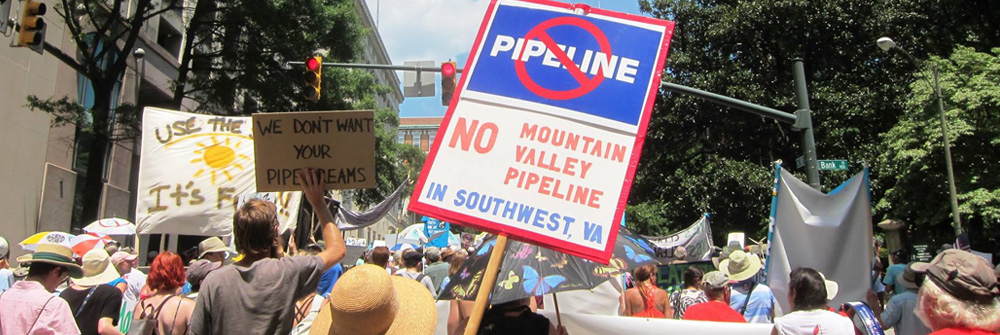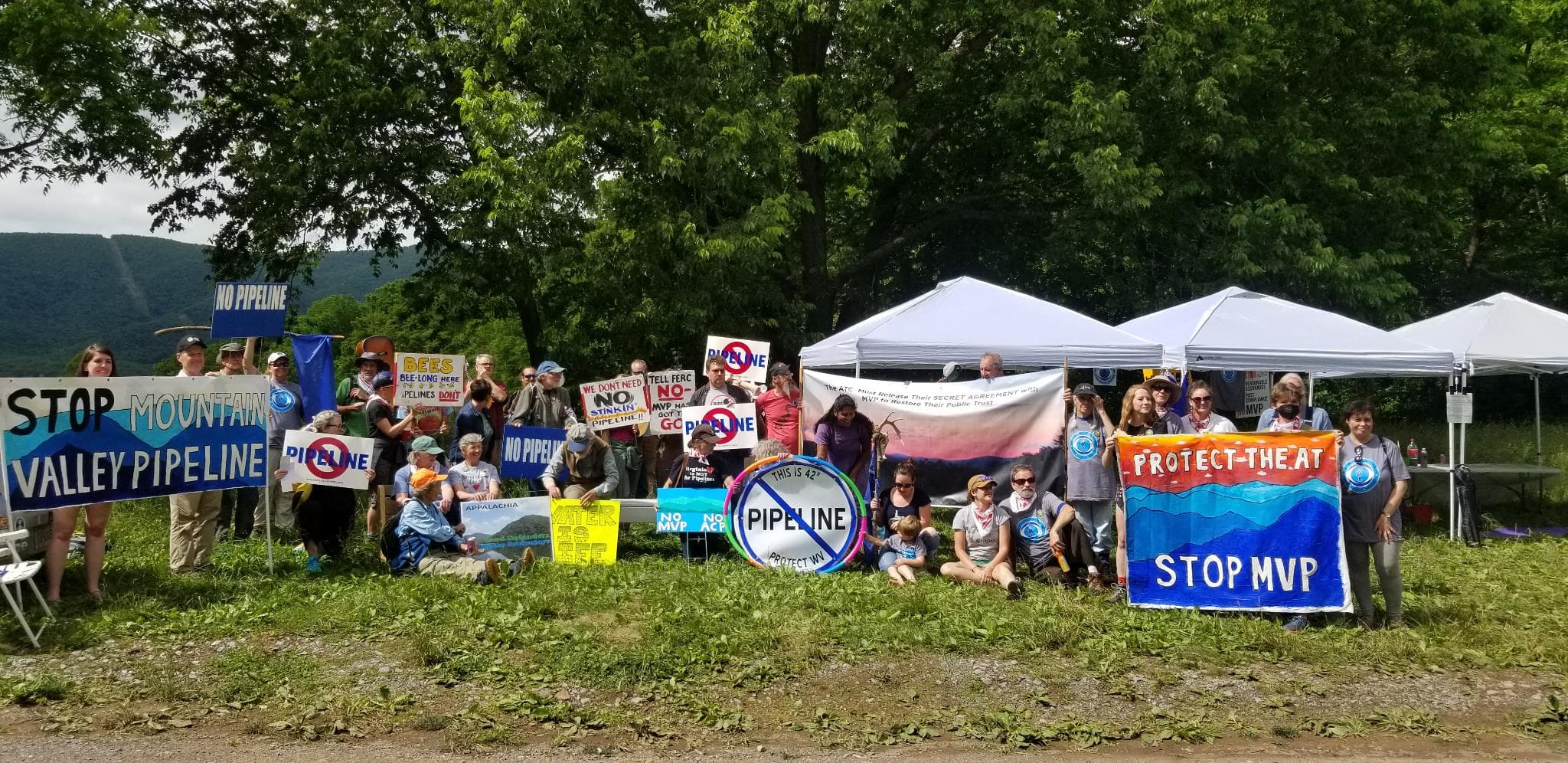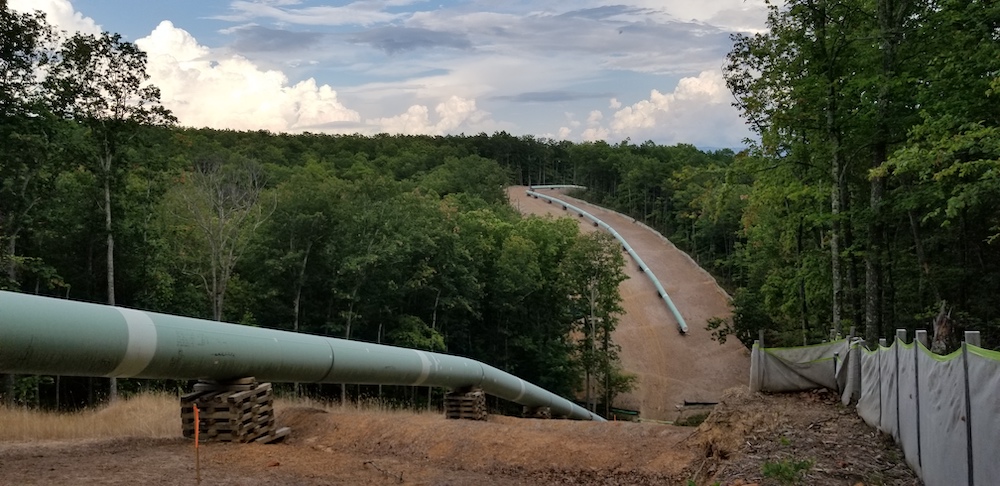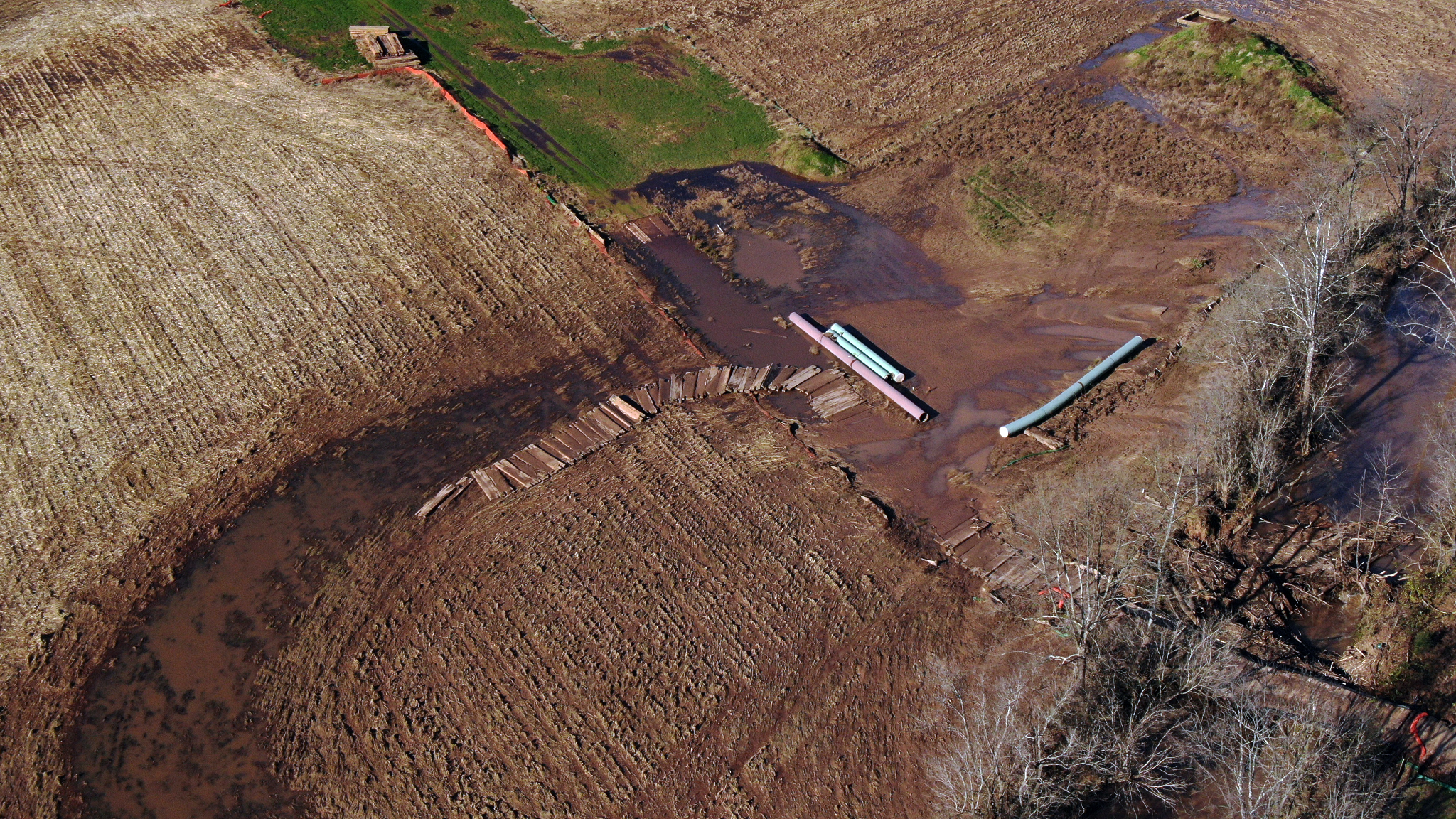Mountain Valley Pipeline

With the most difficult and risky work remaining, the project is far from complete
Ten years after private companies set out to build the 303-mile Mountain Valley Pipeline across the mountains, rivers and farmlands of West Virginia and Virginia, the project has been placed into operation billions of dollars over budget and years behind schedule. Despite evidence highlighted by experts since the project’s start that there was no economic need for the pipeline and serious safety concerns community members raised about the project, in 2024, the MVP was granted permission by federal authorities to be placed in service. The pipeline became operational on June 14, 2024.
In this difficult moment, the community-led movement to oppose MVP is still bigger than ever. Communities threatened by the pipeline are focused on monitoring the restoration efforts and increasing safety standards and emergency funding for counties along the route.
Despite people speaking up and fighting to stop the pipeline, MVP was bolstered by politicians who did not heed the best interests of the people they represent, and state and federal agencies whose missions — ironically — are to protect communities and the environment. Agencies like the Federal Energy Regulatory Commission and the Virginia Department of Environmental Quality have assisted MVP developers by disregarding the dire warnings of thousands of community members, geologists, karst specialists, engineers, health professionals and pipeline opponents who have all said that there is no way to build MVP without harmful impacts.
The Virginia DEQ ignored its mandate as a watchdog for the state’s environment and residents by approving water permits for MVP to cross rivers, streams and wetlands. MVP has racked up at least 350 water quality violations in Virginia since construction began in early 2018 and over $2.5 million in fines. In the meantime, incidents of mudslides, rolling equipment, slipped pipe and increased sediment in waterways are continuing to occur.
The project has been ill-managed at every stage of its development: bad planning and poor construction, faulty erosion and sediment control attempts, and improper assessment and enforcement of fines. The communities, on the other hand, have been justified at every stage: raising the alarm, engaging elected officials, sharing knowledge and expertise about the region, alerting regulators, monitoring construction, challenging MVP in court when necessary, supporting each other and bringing the fight against dirty fossil fuel energy to a broader audience.

Residents Say: “No to Mountain Valley Pipeline!”
When plans for MVP were announced in 2014, residents along the route swiftly organized, educating themselves on potential impacts and sharing information with each other. They set up meetings and formed community-led groups, like the Protect Our Water, Heritage, Rights Coalition and Mountain Valley Watch, a collaboration of volunteers and experts who observe, document and report environmental issues they see during the pipeline’s construction.
Appalachian Voices has supported community-led efforts in myriad ways — hosting water quality monitoring trainings with Trout Unlimited and West Virginia Rivers Coalition, helping connect opponents with allies, lawmakers, the media and others, legally challenging improperly approved permits and providing technical and organizing guidance and support.
Multiple local governments, like Craig County and Roanoke County in Virginia, expressed opposition against the pipeline due to pressure from constituents who oppose MVP. Community groups have organized protests and demonstrations against the pipeline with some individuals being arrested for protesting or participating in tree-sits at or near pipeline construction sites.
Below we have highlighted some of the concerns from communities along Mountain Valley Pipeline’s path.
Environmental justice: MVP disproportionately impacts low-income communities, elderly residents and Indigenous sites.
Environmental damage: Developers have accrued hundreds of water quality violations and polluted miles of streams and important freshwater habitat. Potential violations stacked up even when stop-work orders stalled construction for months.
Climate impacts: Methane is an extremely potent greenhouse gas and exacerbates climate change. Building this pipeline and others would lock the U.S. into decades of dirty fossil fuel energy.
Destruction of natural beauty and wildlife habitat: MVP would leave a 50-foot-wide strip of permanently cleared land scarring viewsheds along the entire route, including along the Appalachian Trail and Blue Ridge Parkway. It would also cut through about 3.5 miles of the Jefferson National Forest.
Explosions: Much of the pipeline is being built on steep, unstable slopes that are susceptible to landslides — which could cause the pipe to rupture. Explosions happened on two separate pipelines in similar terrain in 2018. In April 2020, MVP reported that three sections of laid pipe had shifted due to land movement. MVP is also using thinner pipe in less-populated areas, making the pipe more susceptible to the risk of rupture. Pipe exposed to sunlight for up to 6 years was used in construction. Degraded materials add to the risk of explosion.
Eminent domain for private gain: In typical industry-friendly practice, the Federal Energy Regulatory Commission allowed MVP to seize people’s land all along the route through eminent domain — even before the developer had secured all required permits and without requiring the company to pay people upfront for their land.

Legal Action against Mountain Valley Pipeline
In a rush to get this unnecessary project built, MVP developers bulldozed through permit processes, moving forward with construction even when not all permits were in place. Work on the pipeline trudged on in fits and starts for the past several years as opponents successfully challenged state and federal approvals. Appalachian Voices partnered with legal teams at Appalachian Mountain Advocates and Sierra Club to challenge MVP’s actions in court to hold it accountable and to stop this ill-conceived, dangerous and unneeded project.
In October 2019, as a result of repeated violations by MVP and persistence from opponents, FERC ordered virtually all work to stop along the pipeline in both states. A year later, however, the stop-work order was lifted for all but a few sections of the pipeline.
A restriction on construction through streams, rivers and wetlands was in effect from fall of 2020 until June 2023, when the U.S. Army Corps of Engineers issued its Clean Water Act 404 permit.
Federal Legislative Updates
Repeated attempts by West Virginia Sen. Joe Manchin to ram through the Mountain Valley Pipeline and radically weaken safeguards for our communities and environment through legislation were hotly contested by a broad coalition of environmental advocates and legislators, and, Manchin’s attempts failed in 2022. But, in June 2023, Manchin successfully added Mountain Valley Pipeline provisions to an unrelated debt ceiling bill called the “Fiscal Responsibility Act.”
The provisions included in the debt ceiling deal forced executive agencies to issue permits for the completion of the Mountain Valley Pipeline, and said no court shall have jurisdiction to review those permits. These efforts were opposed by numerous other lawmakers, including these Virginia legislators: Sens. Tim Kaine and Mark Warner, and Reps. Jennifer McClellan, Bobby Scott, Don Beyer, Gerry Connolly, Jennifer Wexton and Abigail Spanberger. The constitutionality of the FRA was later unsuccessfully challenged in federal court.
The Bad Economics of Mountain Valley Pipeline
Despite what analysts have long warned is a major overbuild of gas infrastructure, Equitrans Midstream Corp., NextEra Energy, RGC Midstream, LLC and others that make up the Mountain Valley Pipeline, LLC, tried to build the pipeline as fast as possible.
The economic outlook for new, major fracked-gas infrastructure has shifted from bad to worse in the past five years — not that it was very good to begin with. Domestic and foreign demand for methane gas has fallen while the rapid growth of clean, renewable energy has proven as a reliable replacement for gas in the energy sector.

Premature in-service operation of Mountain Valley Pipeline
In spring 2024, Mountain Valley Pipeline sought permission to receive “in-service” status for the pipeline before it completed necessary requirements of its consent agreement with the Pipeline and Hazardous Materials Administration. A consent agreement is a negotiated plan for safety and reporting protocols that must be followed to be in compliance with PHMSA, the agency which monitors all pipelines within the country.
On April 22, MVP wrote to FERC: “Mountain Valley requests that the Director of the Office of Energy Projects grant authorization for Mountain Valley to place the Project facilities in service,” further demanding that the agency: “...issue the approval no later than May 23, 2024.” MVP acknowledged that the project was not yet “mechanically complete” and had significant restoration and safety testing required. On May 21, MVP acknowledged it remained behind schedule and requested a decision from FERC’s Office of Energy Projects one day after its next request for “in-service” status.
MVP’s request was premature. The 2023 Fiscal Responsibility Act’s inclusion of Mountain Valley Pipeline did not absolve safety requirements for the project, and MVP was subject to an October 3, 2023, consent agreement. The safety agreement outlined increased testing and reporting requirements for the pipeline.
Community members and elected officials expressed significant concern about the request for the pipeline to be placed in service, as did the Montgomery County Board of Supervisors, Roanoke County Board of Supervisors, Franklin County Board of Supervisors, 23 Virginia state legislators, Rep. Morgan Griffith and Sen. Tim Kaine.
Rep.Griffith said to E&E News: “Mountain Valley has given the impression that all is well with the project. Despite this, the sudden failure of one pipe is an alarming development. I believe the full pipeline should be tested before there is any discussion of placing it into service.”
Sen. Tim Kaine stated to E&E News: “The testing has shown all kinds of problems,” Sen. Tim Kaine (D-Va.) said on Capitol Hill. “There continue to be the kind of environmental violations that slowed them down before. It’s not like Congress waving a magic wand saying, 'Do this project,' made it a project being done well. So I’m not happy with that.”
On June 10, 2024, Mountain Valley Pipeline, LLC, sent a letter to the Federal Energy Regulatory Commission asking commissioners to grant pipeline operators permission by the following day to start running high-pressure methane gas through the Mountain Valley Pipeline on the basis that the pipeline was “mechanically complete.”
In the letter, MVP developers claim they met a key restoration standard needed to place MVP facilities into service. But MVP developers are under a consent agreement with the Pipeline Hazardous Materials and Safety Administration, and that agency has not yet provided the public with key safety information — including whether the pipeline is in compliance with all aspects of the consent agreement and the results of a recent study of a pipe that ruptured during high-pressure testing.
The following day, the Federal Energy Regulatory Commission allowed the Mountain Valley Pipeline to go in-service. The pipeline was placed into operation on June 14, 2024. A significant amount of restoration remains in Virginia and to date, the results of the metallurgical study of the ruptured pipe have not been released.
Developers’ Projected Cost and Timeline in 2023:
Developers’ Projected Cost and Timeline in 2014:
Up to $3.5 billion, completed by late 2019
Continuing the Fight
Countless community groups and allied organizations including Appalachian Voices continue to push back against this fracked-gas pipeline, and the proposed Southgate extension into North Carolina. Below is a list of some of these organizations and networks.
-
Protect Our Water, Heritage, Rights: A coalition of 15 local organizations in Virginia and West Virginia
-
Sierra Club Virginia Chapter




